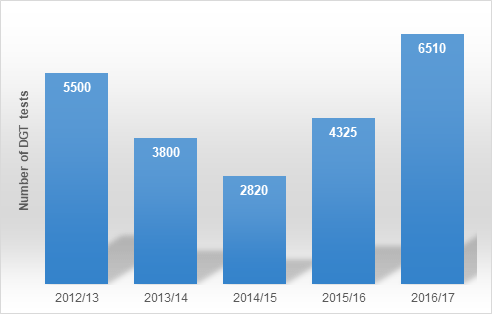Commercialisation of Diffusive Gradients in Thin-films (DGT) for Phosphorus Measurement in Australian Soils
Background
Selected regions of South Australia have difficulty in addressing phosphorous nutrition and current soil testing via the Colwell P method in these regions is inadequate. Calcareous soils that are common in southern Australia retain stable calcium phosphate products, but crops are rarely able to extract this form of P but the Colwell P soil test can.
The new method called Diffusive Gradients in Thin-films (DGT) was first invented in the UK in the late 1990’s and on the back of promising glasshouse and field trial results DGT was first made available in Australia (in 2012) as a commercial soil test for P.
Agronomy Solutions is driving the DGT commercialisation process working closely with the commercial laboratories offering the test: APAL in Adelaide, Nutrient Advantage in Werribee, Victoria and EP Analysis in Cummins, South Australia.
Interest in this type of testing which measures the diffusive supply of available P in the soil toward by employing a P sink (an iron oxide gel) in addition to another membrane which controls movement of P to the sink has been on the increase.
DGT testing differs from the traditional Colwell P testing by mimicking the plant roots uptake of P rather than a chemical extraction and displacement of P with another anion under fixed pH conditions.
Project Details
Timing
Ongoing
Project participants
Agronomy Solutions,
University of Adelaide,
DGT Research Pty Ltd
Locations
Southern and Western Australia
Project Objectives
Agronomy Solutions aims to provide expert assistance to both commercial and research laboratories but also to advisors and growers who receive a DGT number. We provide the supplies (membranes and devices) to the laboratories along with DGT interpretation sheets which include:
How to accurately perform at DGT test
What a DGT number means
Agronomy Solutions ensures good quality control of the DGT products and also provides check soil samples to each laboratory to ensure minimal variance between labs. As a business we also promote the use of DGT for soil types where it’s applicable and provide education workshops to enable new users or existing users to learn more about DGTs capabilities.
Through commercialisation of DGT testing, Agronomy Solutions is also working towards developing a P rate calculator for growers to use in the field. Trials are underway with several clients to work on how the results have practical application. There is also potential with DGT technology to measure in one assay the interaction between aluminium and P.
Results
Since its introduction as a commercial test in 2013, DGT sales were initially around the 5000 mark which reduced to around 2800 in 2015. Since this time, uptake of DGT has increased to over 6500 this current calendar year (2017). Some of this increase can be attributed to the increased use of DGT in Western Australia. In an independent study, the DGT method proved to be a more accurate soil test on the gravel soils in WA which contain high amounts of Aluminium (Al) and can be acidic. Colwell P values on these soil types tend to be high, indicating sufficient P levels are present but moderate amounts of P applications still need to occur to ensure crops reach maximum yields.
Agronomy Solutions continues to support the use of both DGT and Colwell P soil tests in the initial stages to see if a particular soil type might be prone to P overestimation by the traditional method. If the two soil tests provide similar recommendations, then this provides confidence the Colwell P can be used to interpret available soil P levels. Soil types to be aware of where overestimation of P availability might be occurring are those that have high P retention abilities with either calcium carbonate or high Al/Iron present.

Figure 1
Number of DGT sales per financial year since it was first released. Agronomy Solutions took over commercial operations at the start of 2016.
DGT has been validated for a range of crop types but being a new soil test it is data hungry, so we would like to work with anyone who is performing a P response trial with different crop types.
Agronomy Solutions also encourages new commercial laboratories to start testing the DGT method to see if it fits within their operations. We potentially have two new laboratories starting DGT operations in 2018.
